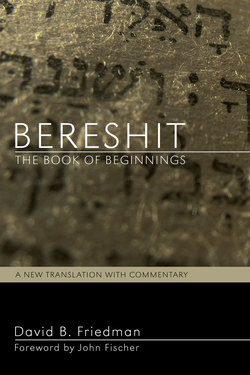Читать книгу Bereshit, The Book of Beginnings - David B. Friedman - Страница 5
На сайте Литреса книга снята с продажи.
Foreword
ОглавлениеBereshit, The Book of the Beginning, an ambitious undertaking to say the least, is a wonderful volume. Dr. David Friedman takes the reader through this amazing first book of the Torah, and of the Bible itself. Truly as the Hebrew title Bereshit (“in the beginning”) indicates, it is a book of numerous profound beginnings. The amazing narrative begins before the very mists of time itself, when God spoke—perhaps “sang,” as C. S. Lewis suggests—the universe into existence. In the miniscule fragments of micro seconds, the multiple dimensions of our vast universe were compressed into the dimensions of space and time with which we are familiar. In the opening chapters of Bereshit, we discover the formation of our planet and the creation of God’s complex human creatures, as well as his shaping of the animal and plant worlds. We learn of the first revolt—that of the humans against their God—the first sacrifice, the first murder, and the first flood. These colossal events, and more, rush the reader in the span of eleven brief chapters. It’s as if the narrator is speeding through the important preliminaries to arrive at his main theme. Eleven chapters cover thousands of years; the final thirty-nine chapters of Bereshit deal with little more than a century, but what a century! It appears that God is focusing our attention on the events of that century or so.
The renowned medieval rabbi and scholar Rashi raised an important question. Why does the Torah, he asked, begin with the account of creation—and we might extrapolate—and Bereshit? Why when it might more easily have begun with the Exodus and God’s first commandment to his select nation: “This shall be the beginning of months for you,” (Ex. 12.2) referring to the celebration of the momentous events of the Passover story? Another classic medieval rabbi and scholar, Nachmanides (Ramban), grappled with this question over a century later. He concluded that it was clear that God’s creation—and its unfolding ramifications through the rest of Bereshit—stands at the center of Jewish religious thought. Bereshit remains the core and foundation for all that transpires later throughout world history as God guides our world toward its intended climax.
Those crucial thirty-nine chapters trace the story of Abraham and Sarah, Isaac and Rebekah, Jacob and Leah and Rachel, and the thirteen—Jacob had at least one daughter! This part of our amazing narrative details God’s promises and dealings with those whom he selects as his “special people.” These accounts stress that God “promises and performs”; he enters into a covenant (contract) with our ancestors and delivers on his commitments, time after time. Through it all, the narrative reminds us that God’s covenant commitments are irrevocable, tangible and unconditional (gracious to the core). That covenant becomes foundational for the rest of the story that Moses unfolds for us through the Torah, and it shapes the unwrapping of God’s purposes for his world—and through our history—as recorded in the rest of the Scriptures.
Unfortunately, the story of one of the key actors is frequently misconstrued and his character maligned. Rabbi Friedman does much to correct this misreading of Jacob. Jacob, after all, is a name (and man) of great blessing. His name testifies to the God who acts as his (Jacob’s) defending rear guard; it uses terminology similar to that found in the verse (Isa. 52.12) preceding the amazing revelation of God’s ultimate atoning sacrifice—and action “defending” us—described in Isaiah 52.13—53.12! As Rabbi Friedman rightly observes regarding Genesis 28: “Rivka and Yakov understood Esav’s makeup and his disdain for God’s purposes, and so they acted aggressively to insure that the covenants would not be inherited by Esav.” This is but one example of Rabbi Friedman’s astute perceptiveness and insight, as well as his thorough knowledge and scholarship. These same skills also served him well in his earlier works such as They Loved the Torah and Who Knows Rabbi Arika?
Some more morsels from this tasty treat follow. Commenting further on Genesis 28, Dr. Friedman notes concerning Jacob’s assumed conditional vow or deal with God:
However, Yakov had already been assured that God would be with him. I see this verse as a vow made out of gratefulness in reaction to God’s promises of protecting Yakov and providing marvelously for his descendents (cf. v. 15). So, “God will be known as my God” (v. 21) because everyone would know that He brought Yakov back and provided for him, just as He promised. His faithfulness would be known to all. I do not view this as an “if you scratch my back, I’ll scratch yours” deal, as if one could do such a thing with Almighty God! Instead, it is a faithful response to the great promises of the Holy One of Israel.
One final illustration of the treasures found in this volume suggests the words of another rabbi (Rom. 6—7) and reflects those of an ancient prophet (Ezek. 36.25–27).
The Ramban notes that when the Messiah comes, men will choose to do good instead of evil. He writes that the desire to do evil is the outcome of Adam and Eve’s eating of the forbidden fruit: “But during the days of the Messiah, the selection between good and evil will be instinctive for them (mankind). Their hearts will not crave that which is not fit. They will not desire it at all.”
In this delightful volume Dr. Friedman uses easy, idiomatic English while remaining true to the intent of the Hebrew text. Throughout, he makes excellent use of rabbinic sources both to unwrap and to illustrate strategic verses of the sacred text. Dr. Friedman has admirably accomplished his purpose of giving his readers an accessible and enlightening introduction to a foundational book of our Scriptures.
Rabbi Dr. John Fischer
Rosh Yeshiva, Netzer David International Yeshiva
President for Academic Affairs
St. Petersburg Theological Seminary, FL
